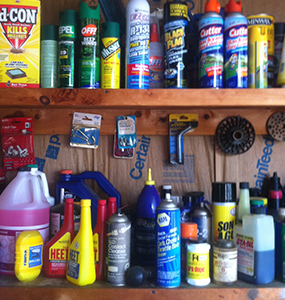Garages contain a ton of chemicals that are dangerous to your furry friends. Some are flammable, others are corrosive, and most are extremely toxic to your dog or cat. While some of these chemicals are found in, around, or dripping from cars, others are used for DIY projects and are commonly stored in garages.
Here’s an overview of the most dangerous chemicals commonly found in garages. If you believe your pet has ingested any of these chemicals, contact your veterinarian immediately.
Antifreeze
Antifreeze is extremely dangerous to pets because of its sweet smell and taste—they tend to dive right in and lap it up. Because of this, antifreeze poisoning is one of the most common forms of poisoning in pets.
The toxin in antifreeze is ethylene glycol, a chemical also found in brake fluid. It doesn’t take much of this stuff to cause fatal damage to your pet’s system, and poisoning affects the brain, liver, and kidneys.
If you think your pet has swallowed this stuff, DO NOT induce vomiting unless instructed by your vet or a poison control center professional. Sometimes the chemical can actually cause more damage coming up than going down.
When it comes to treatment, time is of the essence! Minutes count, and if antifreeze poisoning is caught later than a few hours, there’s a high likelihood of permanent kidney damage that will require lifelong intensive home care, if your pet survives.
For more on antifreeze poisoning in pets, read our more detailed article and watch our interview with Dr. Lee Barteaux. 
Petroleum products
Pets have very severe reactions to petroleum products. Clinically, this condition is known as petroleum hydrocarbon toxicosis. That’s a mouthful, but what you really need to know is which products pose a danger to your pet:
- Gas, diesel, or other fuels
- Solvents (paint thinner)
- Lubricants (motor oil)
- Waxes
- Some pesticides
- Some paints
Leaks and spills are the most common reasons pets get exposed to these products, and it doesn’t take much to affect your dogs and cats. Even contact with skin or breathing vapors can be enough to do some damage. If you pet inhales products like turpentine or benzene they can get chemical pneumonitis – a condition in which the chemical coats the lungs, causes inflammation and trouble breathing.
As with antifreeze, if your pet has swallowed a petroleum product, absolutely DO NOT induce vomiting; this could actually cause your pet to breathe some of it in and develop aspiration pneumonia. The best thing you can do is rush your pet to your veterinarian.
Carbon Monoxide
If you start your car and leave it idling in your garage, make sure your dog or cat has a way out. Pets are far more sensitive to carbon monoxide poisoning than we are; if your dog has ever been car sick, in fact, it is probably due to small instances of poisoning.
Watch for symptoms of carbon monoxide poisoning, which include red gums, mucous membranes around the eyes, twitching muscles, weakness, fever, wobbly legs.
If your pet does inhale a lot of fumes by accident, get him or her to fresh air immediately. If he or she passes out or is acting strangely, get your pet to the veterinarian immediately.
Battery acid
It's pretty much common sense: it’s never a good idea to leave discarded car batteries lying around for your pet, you, or the environment. While most pets are smart enough not to lap up battery acid, if your dog or cat steps in it, their first impulse will be to clean it off. This is not a good scenario – battery acid is highly corrosive and battery acid poisoning is very, very severe.
As with other chemicals, it is important to NOT induce vomiting because it can cause much more damage coming back up. You should make sure to rush your pet to the veterinarian immediately if you suspect your pet has been burned by battery acid.
Prevention
If you’re serious about the health and safety of your pet, it’s important to use common sense and be diligent about what’s going on in your garage. You should frequently make sure that your car isn’t leaking fluids and make sure never to leave old car batteries lying around. Store petroleum-based products out of reach of your pet. If there is a spill or leak, you should act quickly to address it and check on your pet to make sure he or she hasn’t gotten into anything toxic.
For more tips on garage safety and safe alternative to antifreeze and petroleum-based products, talk to your veterinarian.
If you have any questions or concerns, you should always visit or call your veterinarian – they are your best resource to ensure the health and well-being of your pets.
